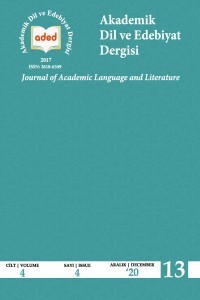
Akademik Dil ve Edebiyat Dergisi
Yazarlar: Gökçen KARA
Konular:Edebi İncelemeler
DOI:10.34083/akaded.703403
Anahtar Kelimeler:Migrant,Identity,Diaspora,Feeling of unbelonging
Özet: The present study aims to lay bare how Kureishi examines the problem of immi-grant identity in The Buddha of Suburbia. Immigrants leave their homeland vol-untarily or involuntarily to have a better life. They can neither continue their own culture nor become involved in the new culture. In Homi Bhaba's words, they experience ‘in betweenneess’. This study refers to Homi Bhabha's main ideas about hybridity, mimicry, liminality and the third space. In this study Bhabha's theories will help highlight how Kureishi's characters create liminal areas and realize their identities in these areas. For the characters in the novel, migration is a never-ending process in which they live simultaneously between the past and the present. Because they have been subjected to many discrimination such as race, language, religion, color and have always been declared ‘other’ in society. Karim is one of the major characters who suffers from being stuck in between. Although he tries to pretend to be British by rejecting the culture of his father, who is Indian, he is never accepted by the racist society in which he lives and he stays in this liminal area without an identity.